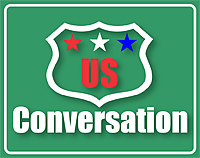
Authentic American Conversation
At Your Fingertips
View Presentation
To view this presentation:
use the arrow keys on your keyboard or
use the navigation star in the lower right-hand corner
The Challenges of Learning Conversational English
For details, click on the links below:
Written Language Bias in Linguistics
Transactional Discourse Preference
Authenticity of Instructional Materials
Limited Classroom Exposure
Written Language Bias in Linguistics
Our conception of language is deeply influenced by a long tradition of analyzing only written language.
Most people regard spoken vernaculars as inferior. What is characteristic of spoken language is often regarded as deviations from "proper language".
The linguistic analysis of conversation is relatively limited.
There is no consensus on how to teach conversational grammar in ESL/EFL classrooms.
Back
Transactional Discourse Preference
Transactional Discourse is language that serves primarily in the expression of content.
Interactional Discourse is language involved in expressing social relations and personal attitudes.
Since most college and university ESL classes train their student population for further mainstream coursework and professional training, the language of particular focus is academic English with heavy emphasis on content.
Patterns and norms of Interactional Discourse are largely left up to the students to discover on their own.
Back
Authenticity of Instructional Materials
Most ESL/EFL textbooks and materials are written by professional writers/teachers with heavy focus on standard English.
Instructional videos are scripted and staged and do not represent the variety of speech patterns used in authentic communication.
Back
Limited Classroom Exposure
Even an excellent classroom teacher is JUST ONE native speaker. Conversational competency requires practice with multiple speakers of different ages and backgrounds.
Movies, TV, radio, and the Internet are excellent resources, but they do NOT provide feedback on comprehension.
Back
The US Conversation Solution
For details, click on the links below:
Let’s Get Real
The idea is rather simple: if we want our learners to succeed in real life conversations, we need to expose them to - and provide plenty of practice in - identifying and interpreting patterns of casual authentic conversation.
All of our videos are of real, unscripted conversations with native speakers of American English.
Guided Comprehension: Even though authentic conversations can be difficult for students, learners in our program are given immediate feedback and are supported every step of the way.
Back
Let’s Go Deep
We focus on both the “surface” and “deep” levels of meaning.
The surface level is what is usually taught in ESL/EFL classrooms. It addresses general questions like Who? What? Where?
The deep level is more complex. It involves feelings and attitudes we learn by being members of a cultural group. This level is OUR focus.
Back
Let’s Work Smart
We explicitly teach learners to identify and interpret correctly the multiple features of spontaneous speech.
When they KNOW these features, they can focus on the MEANING of the utterances rather than the unfamiliar "delivery mechanisms" (the patterns of spontaneous speech).
Standard and academic English is YOUR priority;
Spontaneous conversational English is OURS.
Let’s work together!
Back
US Conversation is:
A comprehensive online program based on
authentic, high-interest video conversationsEquipped with its own Learning Management System
Program Components:
|
|
|
We DO mean authentic.
Take a look at our video samples:
Click here
to view conversation samples
in a new window
US Conversation is appropriate for:
Adult Intermediate - Advanced ESL/EFL Courses
-- Anywhere in the WorldDistance Learning
Hybrid/Blended Environment
-- Additional materials availableCultural Studies
Individual Study
Interested?
Request More Information
View a FREE sample Lesson
Click Here

Home